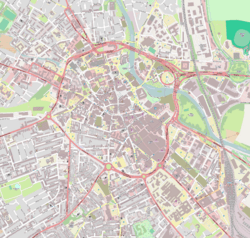St George's Church, Derby facts for kids
Quick facts for kids St George's Church, Derby |
|
|---|---|
| 52°54′47″N 1°29′28.4″W / 52.91306°N 1.491222°W | |
| Location | Derby, Derbyshire |
| Country | England |
| Denomination | Church of England |
| History | |
| Dedication | St George |
| Architecture | |
| Architect(s) | A Macphearson |
| Groundbreaking | 18 October 1889 |
| Completed | 11 September 1890 |
| Closed | 26 December 1937 |
St George's Church was a special church in Derby, Derbyshire, England. It was a mission church for the Church of England. The church served its community from 1890 until 1937.
Contents
The Story of St George's Church
Why a New Church Was Needed
The area around the Firs Estate in Derby was growing very quickly. Many new families moved there. The local church, St Luke's Church, Derby, became too small for everyone. People needed a new place to worship.
So, a small Mission Chapel was opened in Leman Street in June 1880. This chapel was started by Edward Bickersteth (Dean of Lichfield). However, it soon became too crowded for all the people who wanted to attend.
Building the Church
To help raise money for a bigger church, a special memorial stone was laid. Mrs Henry Boden placed this stone on September 8, 1887. Later, the main foundation stone for the new church was laid by Sir William Evans, 1st Baronet. This happened on October 18, 1889.
The church was designed by an architect named A. Macphearson. The building work was done by Walker and Slater, a company from Derby. The first part of the church, called the chancel, was finished and opened on September 11, 1890.
In 1895, a decorative screen called a reredos was added behind the altar. This reredos was not new; it was bought second-hand from St Paul's, Burton upon Trent.
The Church Closes
St George's Church continued to serve the community for many years. However, the Bishop decided not to make it a separate parish. A parish is a specific area that a church serves.
Because of this decision, the church held its final service on December 26, 1937. After that, the people who went to St George's joined the congregation of St Luke's Church, Derby again. The building of St George's Church was taken down in 1938.
The Church Organ
An organ was installed in St George's Church by a company called Bishop and Son. It was first played on March 22, 1899. The organist who played it that day was George Pattman, who was the organist at All Saints’ Church in Scarborough.
The only organist who worked at St George's Church for a long time was R.T. Orme. He played the organ there from 1899 until the church closed in 1937.
 | Toni Morrison |
 | Barack Obama |
 | Martin Luther King Jr. |
 | Ralph Bunche |


